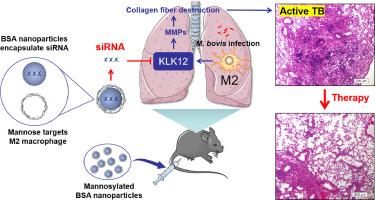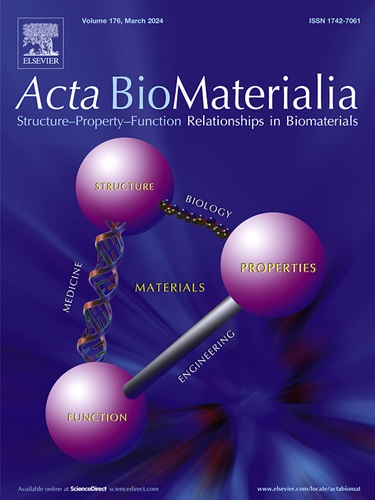纳米颗粒以 M2 巨噬细胞为靶点,抑制凯利克瑞因相关肽酶 12,用于治疗结核病和耐药性结核病。
IF 9.4
1区 医学
Q1 ENGINEERING, BIOMEDICAL
引用次数: 0
摘要
基质金属蛋白酶(MMPs)参与肺细胞外基质的分解,并因此将结核分枝杆菌释放到气道中。最近的研究表明,凯利克雷因相关肽酶 12(KLK12)能调节 MMP-1 和 MMP-9,这表明靶向 KLK12 基因可能是一种很有前景的结核病(TB)治疗方法。为了最大限度地发挥治疗潜力,这种沉默 KLK12 的策略需要在保留其他肺巨噬细胞的免疫保护和组织平衡功能的同时,将其传递给致病细胞群。我们的研究发现,KLK12在M2巨噬细胞中高度表达,因此我们设计了甘露糖基牛血清白蛋白纳米颗粒(MBNPs),用于递送siRNA以沉默这些细胞中的KLK12。体外实验结果表明,借助甘露糖和甘露糖受体靶向作用,MBNPs能准确进入M2巨噬细胞并持续释放KLK12-siRNA。体内实验结果表明,腹腔注射 MBNPs 后 1 小时内即可到达肺部,6 小时达到峰值。MBNPs 通过降低 KLK12/MMPs 的水平增加了肺部的胶原纤维含量,从而限制了肺结核的发展。重要的是,在肺结核和耐药肺结核模型中,MBNPs 都能更大程度地缓解肺结核症状并减少细菌负荷。这些发现为结核病的治疗提供了另一种有效的选择,尤其是在出现耐药性时。意义说明:使用小干扰 RNA(siRNA)进行 RNA 干扰可针对各种基因,具有治疗结核病(TB)等疾病的潜力。然而,siRNA 在血液中和细胞内并不稳定。本研究介绍了通过脱溶合成的包裹 KLK12-siRNA 的牛血清白蛋白纳米颗粒(BNPs)。添加了甘露糖层(MBNPs),以 M2 巨噬细胞上的甘露糖受体为目标,促进内吞。低 pH 值响应的 MBNPs 可促进 siRNA 的溶酶体转运,从而下调 KLK12 通路。试验证实,在小鼠模型中,MBNPs 能有效抑制牛分枝杆菌的增殖,减少肉芽肿,减轻炎症反应。这项研究旨在减少抗生素的使用,缩短治疗时间,并提供一种新型结核病治疗方案。本文章由计算机程序翻译,如有差异,请以英文原文为准。

Nanoparticles target M2 macrophages to silence kallikrein-related peptidase 12 for the treatment of tuberculosis and drug-resistant tuberculosis
Matrix metalloproteinases (MMPs) are involved in the breakdown of lung extracellular matrix and the consequent release of Mycobacterium tuberculosis into the airways. Recent studies indicate that kallikrein-related peptidase 12 (KLK12) regulate MMP-1 and MMP-9, suggesting that targeting the KLK12 gene could be a promising tuberculosis (TB) treatment. To maximise therapeutic potential, this strategy of silencing KLK12 needs to be delivered to the pathogenic cell population while preserving the immunoprotective and tissue homeostatic functions of other lung macrophages. Our research found that KLK12 is highly expressed in M2 macrophages, leading us to design mannose-based bovine serum albumin nanoparticles (MBNPs) for delivering siRNA to silence KLK12 in these cells. The results of in vitro experiments showed that MBNPs could accurately enter M2 macrophages and sustainably release KLK12-siRNA with the help of mannose and mannose receptor targeting. The results of the in vivo experiments showed that MBNPs could reach the lungs within 1 h after intraperitoneal injection and peaked at 6 h. MBNPs increased collagen fibre content in the lungs by decreasing the levels of KLK12/MMPs thereby limiting the progression of TB. Importantly, MBNPs provided greater alleviation of pulmonary TB symptoms and reduced bacterial load in both TB and drug-resistant TB models. These findings provide an alternative and effective option for the treatment of TB, especially when drug resistance occurs.
Statement of significance
RNA interference using small interfering RNA (siRNA) can target various genes and has potential for treating diseases such as tuberculosis (TB). However, siRNAs are unstable in the blood and within cells. This study presents bovine serum albumin nanoparticles encapsulating KLK12-siRNA (BNPs) synthesized via desolvation. A mannose layer was added (MBNPs) to target mannose receptors on M2 macrophages, facilitating endocytosis. The low pH-responsive MBNPs enhance lysosomal escape for siRNA delivery, downregulating the KLK12 pathway. Tests confirmed that MBNPs effectively inhibited Mycobacterium bovis proliferation, reduced granulomas, and decreased inflammation in a mouse model. This research aims to reduce antibiotic use, shorten treatment duration, and provide a novel TB treatment option.
求助全文
通过发布文献求助,成功后即可免费获取论文全文。
去求助
来源期刊

Acta Biomaterialia
工程技术-材料科学:生物材料
CiteScore
16.80
自引率
3.10%
发文量
776
审稿时长
30 days
期刊介绍:
Acta Biomaterialia is a monthly peer-reviewed scientific journal published by Elsevier. The journal was established in January 2005. The editor-in-chief is W.R. Wagner (University of Pittsburgh). The journal covers research in biomaterials science, including the interrelationship of biomaterial structure and function from macroscale to nanoscale. Topical coverage includes biomedical and biocompatible materials.
 求助内容:
求助内容: 应助结果提醒方式:
应助结果提醒方式:


